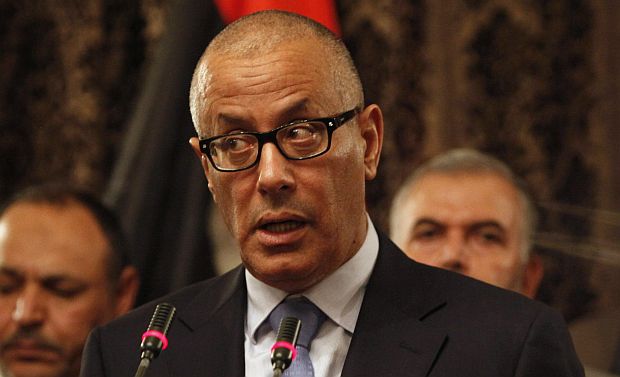
Libya’s Prime Minister Ali Zeidan speaks during a news conference at the headquarters of the prime minister’s office in Tripoli October 11, 2013. (Reuters)
Tripoli and Benghazi, Reuters—Libya’s Prime Minister Ali Zeidan said on Friday gunmen who abducted him briefly were part of a coup attempt by opponents in the country’s legislature.
The militia snatched Zeidan from the Tripoli hotel where he lives during a dawn raid on Thursday only to release him hours later in an incident that showed how far Libya has descended into chaos two years after Muammar Gaddafi’s fall.
Shortly before Zeidan spoke car bombs exploded in front of the Swedish consulate and a mosque in Benghazi in the oil-rich east, which is being hit by a wave of violence.
“They wanted to overthrow the government,” Zeidan said in a televised national address. “This was not an attempted kidnapping only of a prime minister…but of the state’s elected legitimacy, the government.”
He accused unnamed members of the General National Council, the country’s national assembly, of being involved in the abduction. The assembly is caught in a deadlock between the secular leading party and the Muslim Brotherhood, and Zeidan has been facing a possible vote of no confidence.
The gunmen who snatched Zeidan, former anti-Gaddafi rebels now on the government payroll, said they were angry at reports the government had been informed in advance of a US raid to capture an Al-Qaeda suspect in Libya.
Zeidan said armed groups like the kidnappers wanted to create chaos. “They want to turn Libya into Somalia, into Liberia, into Congo-Kinshasa after (Sese Seko) Mobutu was ousted,” he said, standing with his cabinet.
He described in detail how the gunmen had dragged him out of his hotel room in the middle of the night after surrounding the building with 100 heavily-armed cars.
“They took everything, even my underwear, suits, coats, a bag full of documents, cell phones and my iPad computer,” Zeidan said, adding that some of his papers had been later uploaded on the internet.
Zeidan said the kidnappers had also questioned him. “They wanted to know whether I am German,” said the premier, who lived for many years in Europe during Gaddafi’s rule.
Zeidan spoke shortly after car bombs exploded outside the Swedish consulate and a mosque in the eastern city of Benghazi.
“The facade and windows were damaged but no staff was injured. The consulate is closed on Fridays,” Sweden’s Foreign Ministry spokeswoman Ursula Ahlen said.
Sweden is one of the few countries that still have a mission in Benghazi. Its building also houses the office of Finland’s honorary consul.
The coastal city, where many people demand autonomy from Tripoli, has seen a string of attacks on foreign missions and companies as well as assassinations of army and police officers.
In another part of Benghazi, a car bomb wounded a preacher as he came out of a mosque after Friday prayers, a security source said, adding that the attack was probably part of a rivalry between armed groups.
More than 100 Islamists later staged a protest in Benghazi against Zeidan, driving cars mounted with guns and accusing the government of playing a role in the detention of the Al-Qaeda suspect.
In Tripoli last Saturday, US special forces seized Nazih al-Ragye, also known as Abu Anas al-Liby, a Libyan suspect in the 1998 bombings of US embassies in Kenya and Tanzania that killed 224 civilians.
“Zeidan, you are an US agent,” the Benghazi crowd shouted. “We want to be ruled by Islamic law.”
Zeidan, a liberal, has come under pressure for failing to improve public services since Gaddafi’s overthrow and has faced a wave of strikes and protests that have closed most Libyan oil ports.
To help maintain security, the government relies on militias made up of thousands of the Libyans who took up arms against Gaddafi. But the rival groups have often become security threats themselves.
This is especially true in Benghazi, where the 2011 revolt began and where the US ambassador was killed during an Islamist assault on a US diplomatic mission a year ago.
